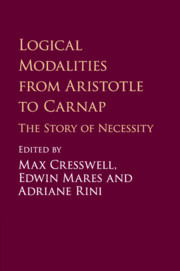Book contents
- Frontmatter
- Contents
- List of Figures and Tables
- List of Contributors
- List of Abbreviations
- Introduction
- 1 Aristotle on the Necessity of the Consequence
- 2 Aristotle on One- Sided Possibility
- 3 Why Does Aristotle Need a Modal Syllogistic?
- 4 Necessity, Possibility, and Determinism in Stoic Thought
- 5 Necessity in Avicenna and the Arabic Tradition
- 6 Modality without the Prior Analytics: Early Twelfth Century Accounts of Modal Propositions
- 7 Ockham and the Foundations of Modality in the Fourteenth Century
- 8 Theological and Scientific Applications of the Notion of Necessity in the Mediaeval and Early Modern Periods
- 9 Locke and the Problem of Necessity in Early Modern Philosophy
- 10 Leibniz's Theories of Necessity
- 11 Leibniz and the Lucky Proof
- 12 Divine Necessity and Kant's Modal Categories
- 13 Charles Sanders Peirce on Necessity
- 14 The Development of C. I. Lewis's Philosophy of Modal Logic
- 15 Carnap's Modal Predicate Logic
- Bibliography
- Index
4 - Necessity, Possibility, and Determinism in Stoic Thought
Published online by Cambridge University Press: 05 September 2016
- Frontmatter
- Contents
- List of Figures and Tables
- List of Contributors
- List of Abbreviations
- Introduction
- 1 Aristotle on the Necessity of the Consequence
- 2 Aristotle on One- Sided Possibility
- 3 Why Does Aristotle Need a Modal Syllogistic?
- 4 Necessity, Possibility, and Determinism in Stoic Thought
- 5 Necessity in Avicenna and the Arabic Tradition
- 6 Modality without the Prior Analytics: Early Twelfth Century Accounts of Modal Propositions
- 7 Ockham and the Foundations of Modality in the Fourteenth Century
- 8 Theological and Scientific Applications of the Notion of Necessity in the Mediaeval and Early Modern Periods
- 9 Locke and the Problem of Necessity in Early Modern Philosophy
- 10 Leibniz's Theories of Necessity
- 11 Leibniz and the Lucky Proof
- 12 Divine Necessity and Kant's Modal Categories
- 13 Charles Sanders Peirce on Necessity
- 14 The Development of C. I. Lewis's Philosophy of Modal Logic
- 15 Carnap's Modal Predicate Logic
- Bibliography
- Index
Summary
Introduction
Necessity and possibility in Stoic thought run deep, through logic, physics, and ethics together. There is a wealth of scholarship just on Stoic responses to Diodorus Cronus's Master Argument that everything possible either is or will be true, revealing the Stoics’ sophisticated propositional logic and modal theory. Likewise, scholars have long mined the Stoics’ innovative theory of causation and their unique commitment to an everlasting recurrence of the cosmos, elucidating the scope of necessity and possibility in Stoic physics. And, perhaps most famously, the vexed relationship between determinism and responsibility testifies to another vein of modality running through Stoic ethics. This chapter will argue that underwriting the Stoics’ moves in all these areas is a distinction among logical, metaphysical, and what I will call providential necessity and possibility.
Complicating matters, the Stoics are known to embrace apparent paradox, a trace of Eleatic influence through the Megarians. It will become apparent as we proceed that understanding Stoic thought is doubly challenging: in addition to the exegetical and interpretative challenge of dealing with ancient, self-consciously paradoxical views, there is also, inextricably, the basic reconstruction of Stoic views through often hostile lenses. The textual evidence of Stoic thought is fragmentary, scant, and subject to widespread interpretative debate. The method of this chapter will be to undertake a close textual analysis of a single piece of testimony from Diogenes Laërtius on Stoic modality, bringing other passages to bear as needed. I will show that we can find these three senses of necessary and possible in Diogenes’ report, and that the Stoics can exploit this systematic ambiguity to embrace the air of paradox while crafting a unique compatibilism in their ethics, making room for counterfactual truth in a predetermined physics, and upholding bivalence amid genuinely possible futures.
By logically necessary, I will mean what is true a priori (e.g., If it is day, it is day). By metaphysically necessary I will mean what is true a posteriori, as a function of the active principle (archē), i.e., god or divine logos, working on the passive principle, matter (hulē): a world order according to certain metaphysical principles and natures.
- Type
- Chapter
- Information
- Logical Modalities from Aristotle to CarnapThe Story of Necessity, pp. 70 - 90Publisher: Cambridge University PressPrint publication year: 2016
- 2
- Cited by



